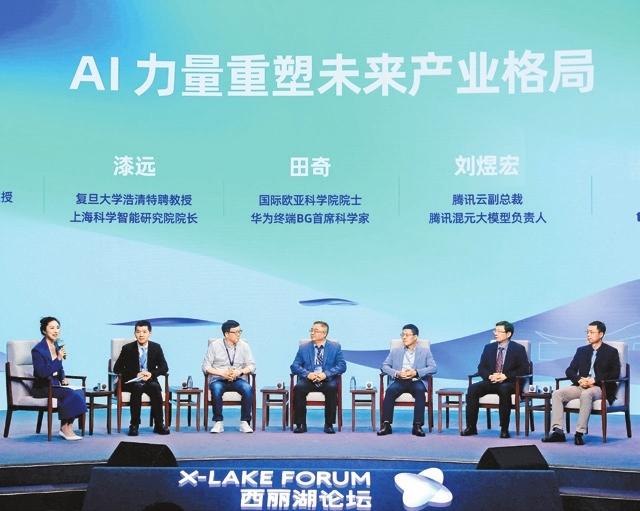
OUYANG ZHENG, dean of the Tsinghua Shenzhen International Graduate School, presided over the main forum. Ouyang highlighted how the accumulation of human knowledge and the advent of supercomputing have propelled us into the AI era, prompting a re-evaluation of daily life, technological iteration, scientific research paradigms, and even human cognition and learning. Fields Medal recipient Efim Zelmanov, a distinguished academician of both the Chinese Academy of Sciences (CAS) and the National Academy of Sciences in the U.S., delivered a keynote speech titled “Artificial Intelligence and Mathematics Research.” He offered a unique perspective, emphasizing the integral role of mathematics, particularly vectors and matrices, as the foundation of neural networks. The Peking University Shenzhen Graduate School chancellor and CAS academician Zhang Jin delivered a speech titled “AI: Innovating the Research Paradigm of Materials” and discussed how AI is transforming materials science research by addressing data standardization and expanding research methodologies. Xue Lan, senior professor of humanities at Tsinghua University and dean of Schwarzman College, gave a speech titled “Urban Innovation and Development and AI Security Governance.” Xue underscored the need for balanced AI governance to navigate the challenges of rapid urban development and traditional governance models. Joachim Hornegger, president of Friedrich-Alexander-Universität Erlangen-Nürnberg and a member of the German National Academy of Science and Engineering, gave a speech titled “AI: From Research to Sustainable and Innovative Practices in the Medical Industry” and articulated a vision of the future where AI enhances personalized medicine. Lionel Ni Ming-shuan, founding president of the Hong Kong University of Science and Technology (Guangzhou) and a fellow of the Hong Kong Academy of Engineering Sciences, delivered a speech titled “Deepening Education Reform — AI Driven Personalized Learning Path.” Ni advocated for strategic educational shifts to integrate AI, promote personalized learning, and foster innovation while mitigating risks.(Zhang Yu) | 
